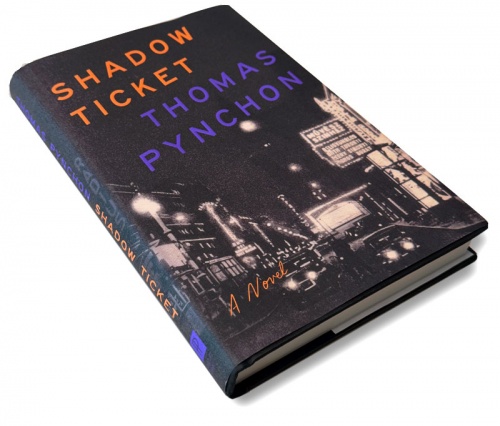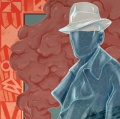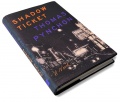Difference between revisions of "Main Page"
| Line 9: | Line 9: | ||
<!-- *Penguin Press's [[Bleeding_Edge_trailer|'''trailer''']] for ''Bleeding Edge'' --> | <!-- *Penguin Press's [[Bleeding_Edge_trailer|'''trailer''']] for ''Bleeding Edge'' --> | ||
| − | This is the Wiki for [[Thomas Pynchon]]'s ''Shadow Ticket''. Besides using the [[ | + | This is the Wiki for [[Thomas Pynchon]]'s ''Shadow Ticket''. Besides using the [[ST_Alpha_Nav|'''Alphabetical Index''']] and the [[Shadow_Ticket_-_Page_by_Page|'''page-by-page annotation''']], you can also take a look at [[Shadow Ticket cover analysis|''Bleeding Edge'' cover analyses]], read the [[Shadow Ticket Reviews|reviews]], or [[Shadow Ticket Title|entertain some theories on the source of the title]]. |
Check out the [[Songs]] in ''Shadow Ticket'' Playlist. | Check out the [[Songs]] in ''Shadow Ticket'' Playlist. | ||
Revision as of 16:39, 1 October 2025
Welcome to the Shadow Ticket Wiki!If you wish to contact us or suggest edits, use this Contact page.
- Purchase Shadow Ticket:
Paperback Hardcover - Search EBay for Shadow Ticket
- Check out some Featured Articles
- Musicians and works of music mentioned in Shadow Ticket
This is the Wiki for Thomas Pynchon's Shadow Ticket. Besides using the Alphabetical Index and the page-by-page annotation, you can also take a look at Bleeding Edge cover analyses, read the reviews, or entertain some theories on the source of the title.
Check out the Songs in Shadow Ticket Playlist.
Contents
How to Use this Wiki
There are two major ways to use this wiki. The first is the Shadow Ticket Alphabetical Index, used to keep track of the myriad characters, real and imagined, as well as events, arcana, and lots of other stuff. The second is the Spoiler-Free Annotations by Page, which allows the reader to look up and contribute allusions and references while reading the book, in a convenient and spoiler-free manner.
Apart from those, it's up to you.
Shadow Ticket Alpha Guide to Characters, Places & More
Page by Page Annotations
| Chapter 1 pp. 1-11 |
Chapter 2 pp. 12-15 |
Chapter 3 pp. 16-27 |
Chapter 4 pp. 28-38 |
Chapter 5 pp. 39-42 |
| Chapter 6 pp. 43-45 |
Chapter 7 pp. 46-50 |
Chapter 8 pp. 51-57 |
Chapter 9 pp. 58-61 |
Chapter 10 pp. 62-69 |
| Chapter 11 pp. 70-75 |
Chapter 12 pp. 76-81 |
Chapter 13 pp. 82-91 |
Chapter 14 pp. 92-101 |
Chapter 15 pp. 102-114 |
| Chapter 16 pp. 115-122 |
Chapter 17 pp. 123-125 |
Chapter 18 pp. 126-131 |
Chapter 19 pp. 132-141 |
Chapter 20 pp. 142-153 |
| Chapter 21 pp. 154-160 |
Chapter 22 pp. 161-172 |
Chapter 23 pp. 173-178 |
Chapter 24 pp. 179-187 |
Chapter 25 pp. 188-195 |
| Chapter 26 pp. 196-206 |
Chapter 27 pp. 207-209 |
Chapter 28 pp. 210-227 |
Chapter 29 pp. 228-232 |
Chapter 30 pp. 233-238 |
| Chapter 31 pp. 239-243 |
Chapter 32 pp. 244-250 |
Chapter 33 pp. 251-256 |
Chapter 34 pp. 257-263 |
Chapter 35 pp. 264-269 |
| Chapter 36 pp. 270-277 |
Chapter 37 pp. 278-284 |
Chapter 38 pp. 285-289 |
Chapter 39 pp. 290-293 |
Featured Articles
Photo: The East Bay Monthly
"One ought to be accustomed, by now, to Pynchon’s leaving his mysteries unresolved, or at least prepared to give him credit for having done so on purpose. Incompleteness is the inherent vice of paranoid theories of history, the limitation of such theories that Pynchon has always freely acknowledged. Criticism of Pynchon’s “shaggy dog” or sloppy plotting neglects the emphasis that he has always laid on the dual meaning of the word plot. From V. forward, nearly all his novels have been founded on a bedrock of detective fiction and underlayed with science fiction, boy’s adventure, westerns, spy fiction, and other genres that rely, like conspiracy theories, on plotting. His broken plots expose the epistemological brokenness of paranoid systems, which are, after all, nothing but attempts, grander but no less doomed to failure than anyone’s, to make sense of a broken world." Full article »
"Bleeding Edge, however, offers an indication that Pynchon has finally given up on seeking the soul of the nation his family helped found. For Pynchon — the embattled bard of the counterculture, disabused of all allegiance — the last redoubt has become the family, and the last war to be waged is between our virtual identities and the bonds of blood; a war to keep the Virtual from corrupting the Blood, if not forever, then for time enough to let the lil’ Ziggy and Otis Tarnow-Loefflers of this world live with the merest pretense of freedom (childhood). Pynchon understands that in the future there will be no secrets, no hidden complots — everything will be aired and any second life, whether in the cloud or in the firmament, will be despoiled or denied us. Adult sanity, then, must depend not on the lives we make online, but on the lives we make off it — our kids — on how we love them, and how we raise them, and the virtues and good-taste imperatives we pass on to them from our progenitors." Full article »
"[There is] the sheer vitality and fascination, the plummets into beauty and horror, the unique flashes of galactic epiphany, in Pynchon’s method. Our reward for surrendering expectations that a novel should gather in clarity, rather than disperse into molecules, isn’t anomie but delight. Pynchon himself’s a good companion, full of real affection for his people and places, even as he lampoons them for suffering the postmodern condition of being only partly real. He spoils us with descriptive flights." Read the review...
"Kakutani doesn't offer the stylistic flair, the wit, or the insight one gets from Kael and other first-rate critics; for her, the verdict is the only thing. One has the sense of her deciding roughly at Page 2 whether or not a book is worthy; reading the rest of it to gather evidence for her case; spending some quality time with the Thesaurus; and then taking a large blunt hammer and pounding the message home." Read on...
Bleeding Edge Review by David Kipen, for Publishers Weekly, is a well written and insightful appreciation of Pynchon's craft and his new novel! "No one, but no one, rivals Pynchon's range of language, his elasticity of syntax, his signature mix of dirty jokes, dread and shining decency." Read the review...Pynchon Wiki Help and Contributor Guidelines
Click here for help with editing and creating pages.
We have a few conventions we ask that you follow:
- When creating a new page, first check to make sure a page/article about what you want to write about hasn't already been created, by checking the list of all Wiki pages on this Bleeding Edge Wiki. If a page already exists, please modify that one.
- When creating a new page, if its information pertains to one (and only one) specific Pynchon novel, please categorize it with the appropriate identifier. For example, a page pertaining to Bleeding Edge, should use the syntax
[[Category:BE]].
- To open a discussion on an individual listing of the Alpha Index, create one using the entry on Peter Tait as an example. Basically, give it a name that identifies the alpha listing (eg [[Name Discussion|DISCUSSION]]) and notice that the visible name will be "DISCUSSION" in full caps, so it stands out a bit.
External Links
- Latest news on Thomas Pynchon (Google News)
- ThomasPynchon.com
- hashslingrz.com
- Shipwreck Library (was The Modern Word) Pynchon page
- Pynchonoid Blog
- Wikipedia Bleeding Edge page
- Literarywiki.org - wiki annotations to works by Pynchon, Umberto Eco, and many others.
Image Gallery
Below are some of the images you will find on Pynchon Wiki.Current-Affairs-Pyncho...
WikiAdmin
17:22, 23 February 2026
119 KB
Brownie th.jpg
Jsilver2025
12:35, 18 November 2025
9 KB
Maxfield-parrish2.jpg
WikiAdmin
09:26, 13 November 2025
244 KB
Autogyro.jpg
WikiAdmin
16:23, 10 November 2025
32 KB
Kyriazi-Freres.jpg
WikiAdmin
17:12, 9 November 2025
60 KB
Ramon-Novarro-1930s.jpg
WikiAdmin
13:16, 9 November 2025
165 KB
Melachrino-cigarettes.jpg
WikiAdmin
14:32, 7 November 2025
601 KB
Simpsons-Pynchon-NYT.jpg
WikiAdmin
10:55, 19 October 2025
104 KB
Chicago-Union-Station.jpg
WikiAdmin
09:39, 17 October 2025
135 KB
SS-Christopher-Columbu...
WikiAdmin
14:33, 16 October 2025
310 KB
1930-Packard-Custom-Ei...
WikiAdmin
14:05, 16 October 2025
860 KB
1932-half-dollar.jpg
WikiAdmin
13:50, 16 October 2025
80 KB
Annette-Hanshaw.jpg
WikiAdmin
12:03, 12 October 2025
102 KB
Kissel-Speedster.jpg
WikiAdmin
14:32, 11 October 2025
215 KB
Vollmann-article-cropp...
WikiAdmin
19:26, 9 October 2025
51 KB
NYT-10-9-25-Review.jpg
WikiAdmin
18:03, 9 October 2025
796 KB
RWS Tarot 13 Death.jpg
WikiAdmin
12:40, 9 October 2025
901 KB
Bentley-bobtail-1928.jpg
WikiAdmin
15:56, 8 October 2025
72 KB
Cadillac-sport-phaeton...
WikiAdmin
15:44, 8 October 2025
477 KB
Plus-fours.jpg
WikiAdmin
14:09, 6 October 2025
98 KB
Toby-Wing.jpg
WikiAdmin
09:15, 6 October 2025
253 KB
NYT-Essential-Pynchon.jpg
WikiAdmin
12:10, 5 October 2025
92 KB
Nagymezö-Street-1930.jpg
WikiAdmin
09:23, 2 October 2025
91 KB
Blondell.jpg
WikiAdmin
09:17, 1 October 2025
66 KB
Shadow-Ticket US-Cover...
WikiAdmin
12:38, 26 September 2025
88 KB
Thanks, and enjoy...


























